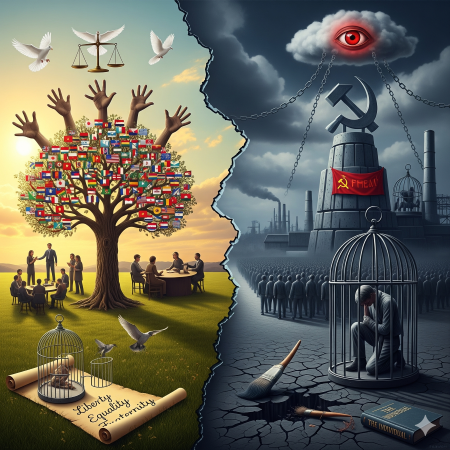What do the successes and failures of both systems reveal about human nature and power?

The successes and failures of both systems reveal that human nature is fundamentally driven by a mix of self-interest and a capacity for collective action, while power, if left unchecked, will always be abused.
Neither democracy nor communism fully accounts for these realities, leading to a consistent gap between their noble ideals and their messy, often disappointing, practice.
Human Nature: Self-Interest vs. Collective Good
Both ideologies make a core assumption about human nature that proves to be a double-edged sword:
-
Democracy’s Assumption: Democracy assumes that individuals are rational, self-interested actors who will collectively make the best decisions for society. The system is designed to harness this self-interest through competition and compromise. Its success lies in the fact that it channels individual ambition—for wealth, status, or power—into productive avenues like entrepreneurship and public service. However, its failures show that unchecked self-interest can corrupt the system. When a politician's personal gain outweighs their duty to the public, or when a corporation's desire for profit harms the environment, the system falters.
-
Communism’s Assumption: Communism, in its purest form, assumes that human beings are fundamentally communal and selfless, and that they will prioritize the good of the collective over their own needs. Its theoretical ideal is to create a society where everyone works for the common good. But its failures reveal that this is a deeply flawed assumption. When the profit motive and individual ownership are removed, the innate human drive for personal advancement and comfort doesn't disappear; it simply finds new, often corrupt, outlets. This leads to stagnation, lack of innovation, and the emergence of a new, politically powerful elite that hoards resources and privileges.
The Unavoidable Reality of Power
The handling of power is the most crucial distinction between the systems and the primary reason for their respective successes and failures.
-
Democracy and Distributed Power: Democracy is built on the principle of distributed power through elections, a system of checks and balances, and the rule of law. The goal is to prevent any single person or group from accumulating too much power. This distribution is democracy's greatest strength, as it provides built-in mechanisms for accountability and course correction. When a leader becomes corrupt or incompetent, they can, in theory, be voted out. The failures of democracy, however, demonstrate that power can still be concentrated through wealth, media control, or political maneuvering, leading to the "tyranny of the majority" or the marginalization of the public voice.
-
Communism and Concentrated Power: In practice, communism has always led to highly concentrated power in the hands of a single-party state and its leaders. The "dictatorship of the proletariat" becomes a permanent, unaccountable dictatorship. This concentration of power is both a strength and a weakness. It allows for rapid, large-scale mobilization—whether for economic development or military action—without the need for public consent or political debate. However, its ultimate failure lies in the historical fact that absolute power is almost always abused. With no checks, no free press, and no opposition parties, leaders are free to engage in widespread political repression, corruption, and human rights abuses, all in the name of the state.
Ultimately, the successes of democracy and the failures of communism both reinforce a single, timeless lesson: human nature, with its mix of virtue and self-interest, requires a political system that manages and restrains power, not one that ignores it or centralizes it. The ability to check power is the true measure of a system's resilience and its capacity to serve its people.
- Questions and Answers
- Opinion
- Motivational and Inspiring Story
- Technology
- Live and Let live
- Focus
- Geopolitics
- Military-Arms/Equipment
- Güvenlik
- Economy
- Beasts of Nations
- Machine Tools-The “Mother Industry”
- Art
- Causes
- Crafts
- Dance
- Drinks
- Film/Movie
- Fitness
- Food
- Oyunlar
- Gardening
- Health
- Home
- Literature
- Music
- Networking
- Other
- Party
- Religion
- Shopping
- Sports
- Theater
- Health and Wellness
- News
- Culture

